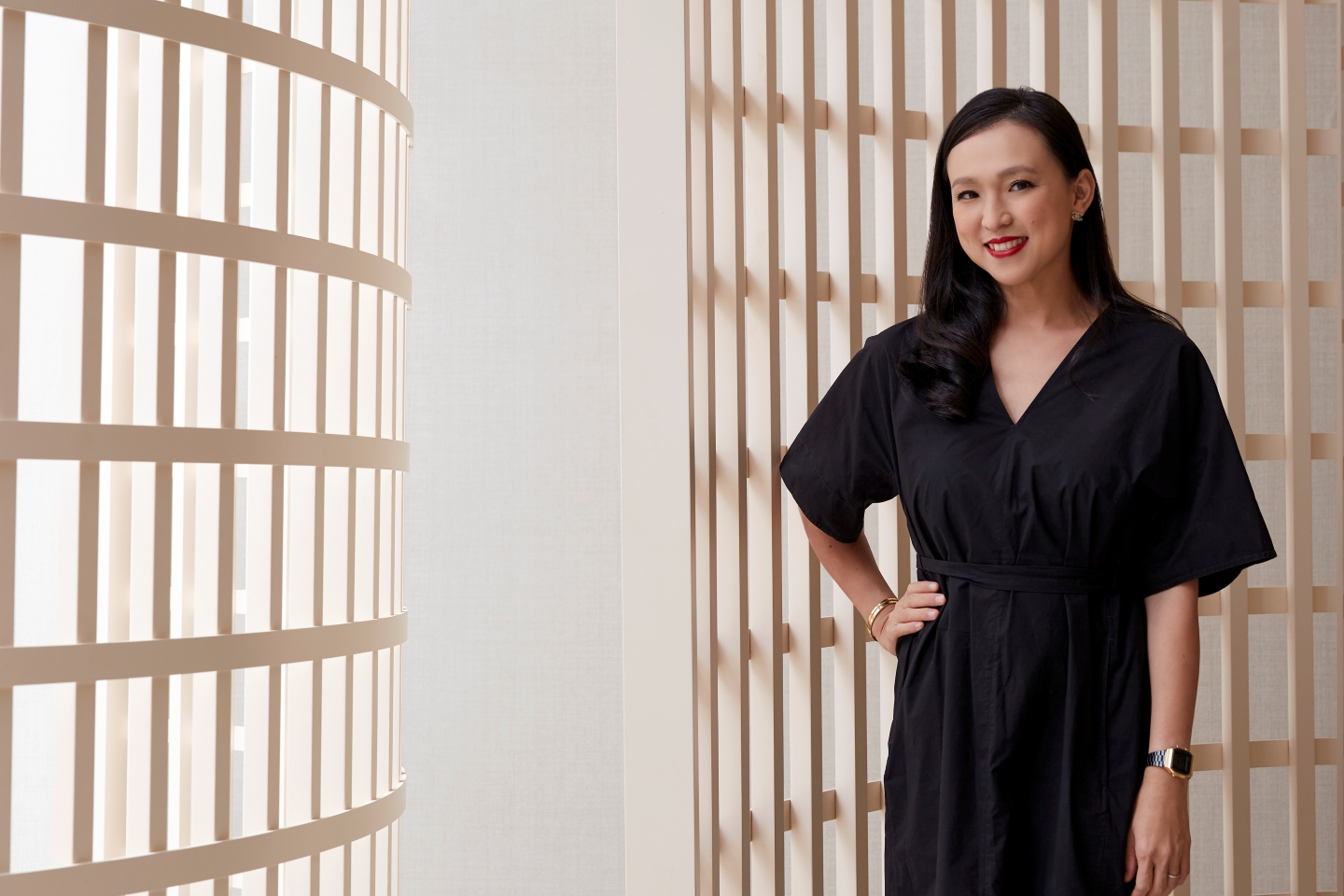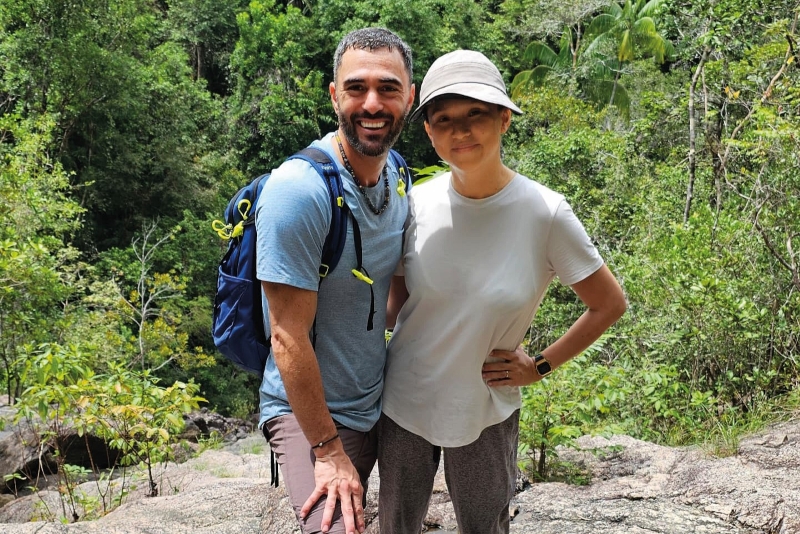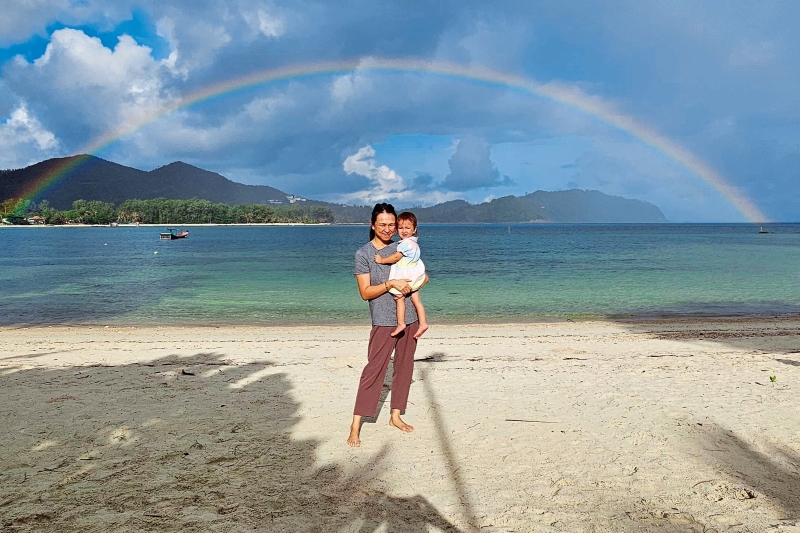
Tan: I did not throw away my life. I simply redefined my priorities. (Photo: SooPhye)
A quiet, candid admission bridges Melissa Tan Chien Yi’s accounts of chasing success as a high-achiever and trading it for laidback idyll on a Thai island. “I was a patient,” she says. With that, she opens up about mental well-being and Atas Mindset, the centre she co-founded to normalise therapy and help people level up — hence its name in Malay — their attitude and outlook.
Tan ticked all the boxes a woman, or man, would aspire to: an Oxford degree, a dream job, a happy marriage and beautiful children, cars, and house. The more she achieved success, the more she craved it because it gave her a good feeling. Still, there was an underlying anxiety she could not put a finger on.
“I was always anxious but didn’t even know it. What I knew was I didn’t like who I was when I came home to my girls — I was in front of them but not present. I struggled for a really long time because I always felt like my identity as a career woman was much stronger than that of being a mother. The truth is, I was completely burnt out before seeing a therapist.
“I didn’t know what burnout was but it sounded like something that happened to weak people. When I became a mum, life started showing me signs that I needed to slow down. But I didn’t know any limits and kept pushing myself and my body through.”
Things came to a head two years ago when her husband, Shai Yurkevich, left Getha Bedding, her family-owned company of which she had been CEO since 2019. “He didn’t even have to say it: I wanted a break, too, and felt this was much more important than what we were doing. I think things fall into place for a reason. At that moment, it was what I felt I needed to do.”
Their decision to sell their home, pack up and move with two young children to Koh Phangan, a 30-minute ferry ride from Koh Samui, had nothing to do with Atas Mindset. The pair had conceptualised the business at end-2023 and opened it last May with co-founder and partner Vincent Lim, a professional counsellor and certified coach.
The psychotherapy centre seeks to help clients achieve emotional resilience and inspire meaningful change, versus the bottom line, Tan adds.
“I’m business-oriented, and the bottom line is always the first factor I consider. Mental wellness is hard to evaluate, thus making policy setting extremely difficult. But let’s not forget we are living with rapid technology shifts and the growing prominence of AI, which have greatly affected mental health. If we do not address this, I’m certain the losses will be bigger later on.”
Rebranding therapy
Psychotherapy should not be viewed as only for the sick or if one has a problem, she thinks. Why isn’t it built for champions? If you want to be one, it is crucial to have a champion’s mindset, to flex your mental muscles and be fit in all aspects.
“Shai and I started Atas Mindset because we saw a demand and a need for this business. Currently, the industry is focused on helping those facing mental challenges. We see it differently,” she says.
“We want to rebrand and reshape the way people think of therapy by positioning it as self-discovery and development, and personal growth. It is an opportunity to look within and develop the inner you. It is not just a cure for when you are suffering, but a supplement you can add to feel better even on days of good health.
“At this point of time, I am not advocating big changes or revolutionising the workplace. I believe in taking small steps and the first is awareness of our mental fitness. We can build from there.”
This idea of a mindset geared towards winning was inspired by former women’s squash world No 1 Datuk Nicol David, whom Tan saw at an event. “She spoke of seeing a sports psychologist and I thought, ‘It’s okay to see one because she needs to focus and win.’
“That was when I felt psychotherapy was the same service, just sold differently. When I told my husband this, he immediately prompted us to start the company ASAP.”
Normalising mental health is a challenge in Asia, she has learnt over the last 10 months. People are curious and they get many enquiries, but the conversion rate is low: About 10% walk through the therapist’s door and 50% continue to the second session.
“I also found this is a pull business. My experience and expertise have always been push marketing, but I realise that with mental health, the need for trust is so deep pushing does not work. Even if it does, it is not sustainable.”
Switching from being part of a company established by her father to helming her own was another learning curve.
“When I was in my family business, resources such as manpower, finance, connections, goodwill and more were never a problem. Starting out fresh was like beginning from ground zero. It can be challenging and is certainly different. But I do enjoy exploring a completely new industry, although we did choose it because we saw the similarities between wellness and sleep.”
From mattresses to mental well-being
The seed for Atas Mindset germinated as an extension of Getha — a play on “getah”, Malay for “rubber” — whose reputation rests on latex mattresses and bedding products, after the brand introduced luxury suites designed for those seeking extravagant cinema comfort.
“With the success of the luxe suites, I wanted to reposition the company as a lifestyle brand, like what my dad had always wished for,” Tan elaborates. “So, we had the mattress and entertainment, and were looking for the next thing. That was when I had the vision of making it a wellness name by adding mental health therapy.”
Prior to leaving Getha, she was planning to work on a line of products for senior customers, particularly small items that can improve sleep and make their daily lives more comfortable because many people have problems falling, or staying, asleep.
Sleep comes easy at Koh Phangan, where the family live by the sea and have more time together. Tan and Shai park their car on the sand and their daughters Liahn and Mika, aged five and two, are much stronger with sun-and-sand play all day. There are big natural pools and mountains that Tan, a hiker, loves, as well as like-minded families around them. And everything is just minutes away, unlike in Kuala Lumpur.
“We felt this is what our kids would really benefit from. When they have a better life, we have a better life, too. Over the years, whenever Shai talked about living on an island, I would think, maybe when we retire. I never thought we could do it now, with the children. We are so blessed to have this window of two years to live by an exotic beach.
“After leaving the family business, which defined us, it felt like we were no longer us. Shai was very quick to say, ‘There’s nothing for me to do here. I don’t want to stay [in KL] any more.’ The decision to relocate was made over one day. We had never spoken about moving, but once he opened his mouth, I said, ‘Okay, let’s go.’”
Shai had his eye on Koh Samui but it never felt right for her. So, last August, they decided on a holiday in Koh Phangan to visit his friend. “Once I arrived, I knew this was it.” They spent three weeks looking for a place to stay and relocated in October.
Settling in was probably smoother because the pair had lived in Thailand for two years a decade ago. In fact, they met in Bangkok in 2014: Tan had work meetings there for Getha and Shai, from Poland and then a diamond trader, was on a business trip.
But shifting gears from a busy schedule of running around to doing nothing, literally, took a while. “In the beginning, you feel like your body needs to do something. But once you adapt to the lifestyle, it’s so relaxing. Yes, I get better sleep at night,” Tan shares.
While Lim manages Atas Mindset’s daily operations and therapists in KL, she focuses on marketing it as a niche wellness brand. And Shai finally gets to enjoy his dream life by the beach.
img-20250326-wa0036.jpg

Bound by obligations
But her parents were not thrilled about their move, which brings Tan to bugbears she talks openly about — family obligations, lack of boundaries and poor communication — because they lead back to mental well-being. Mum was understanding about her having to do what she needed. But dad is “very bitter”, she says, and questioned why she, who had it all, would want to leave.
Growing up in a traditional Chinese family, she feels the weight of unspoken expectations that were “a killer” for this self-confessed people-pleaser. Things are never spelt out but when one does not do as expected, there are the inevitable comparisons and allusions.
“Family obligations are the biggest problem in Asian families and I feel like all my life I’ve been bound by that. I want to please everyone, make sure everyone is taken care of and is happy. But it’s never going to be enough. One of the problems of being a people-pleaser is that we have no boundaries” — a huge topic families like hers know little about.
As often happens, saying “no” is interpreted as selfishness. “Growing up, my family never told me I was selfish. But they would always [cite] examples of people behaving like that and I was so scared to be like them,” Tan recalls.
The Asian habit of ignoring bad feelings is another issue. “When you talk about things, you can solve them. If you don’t, you’re guessing the whole time.”
Perhaps we fear hurting the other person, adds Tan, who points to the root of the problem: Most of us are not used to voicing what we think or feel.
“Everything in life is about practice. If we stop practising something, it becomes smaller. The same with our voice: If we stop talking about our feelings, they get smaller and it becomes harder to [speak out] as time goes by.”
Conversely, there is the danger of problems growing bigger. Time may smooth uneasy relationships or heal hurts, but leaving things unresolved is unhealthy. It can affect one’s health, physically and mentally.
Having children, which brings the incumbent pressure of working a “third shift” — corporate life, household duties and caring for her girls — made her realise the need to be vocal and put herself first.
“Solitude, rest and self-connection are crucial to mental well-being, but we tend not to be mindful of these because of the busyness of our days. Anyone can reach us anywhere, anytime, and social medial pushes us to do more and more,” Tan says.
Also, Asian upbringing stresses the value of working hard as proof of self-worth, leading one to believe “rest is for the weak, solitude is for the lonely and self-connection is worth little compared to being a social butterfly”.
These were among reasons that prompted the family to leave for Thailand. Also, the thought of the effects of a mother’s anxiety on her children or, worse, that they would “copy” what she did.
The demands of motherhood are manifold, she reckons. “Young kids need their mum, yet many women in the city are working full time. Social media gives new mothers added pressure with information overload.
“We are very confused about what is best for us and our child, and all the [posts] online make you feel so small because other people seem to be doing it all.”
Tan is realistic about change and how every person adjusts differently. “Actually, I don’t expect anyone in my family or anyone to change, but I need to learn my own boundary. It’s really tough.”
img-20250326-wa0040.jpg

A safe space
Triggers that affect one’s emotions can pose stumbling blocks to mental fitness. They could be unexpected, like an old song that reminds you of an ex, or a certain tone of voice that stirs memories of a past criticism.Scrolling through social media and seeing something which makes you feel unworthy, or even a loud noise that recalls a stressful incident can also have negative impact.
Tan admits she is not immune to provocation and still does not know how to snap out of it. “A healthy approach would be to reflect on what triggers me and let it go.”
She also observes that while most people are unlikely to hide physical health complications, they often do when it comes to mental struggles. Professional help can boost emotional resilience, another aspect of psychotherapy Atas Mindset emphasises.
Shai sums up therapy as “one hour of talking only about yourself and not feeling guilty about it. It is a lot about self-discovery, a way to flex your mental muscles and build on your mental fitness”.
Deciding to see a therapist was a hurdle he crossed by having his wife accompany him to his first session. “It’s taboo to go for therapy and I’m not crazy, right? So, I asked Melissa to come with me; she stayed outside.”
Once past the door, the next step is to get a therapist you feel at ease with, he says. “A good one leads with conversation and slowly, slowly, you will open up.”
Clients need to shop around and go with someone they feel connected to and who understands them, Shai adds. “It’s like finding a partner. I don’t think anyone should ever give up because once you find the right one, your world opens up.”
They call this therapeutic alliance, a combination of the chemistry between two persons that leads to a safe space where one can be authentic and genuine.
Like those who hit the gym to work on their body, mental wellness therapy requires persistence. Tan’s favourite part of committing to sessions was having the chance to discover why she is what she is. With the rapid advances in technology today, she feels this is the best time to focus on strengthening the inner self.
“Therapy gave me the chance to rewrite the narratives I have spent all my life building outside of me. It’s only in the last few years that I’ve been able to build the inner foundations. As a mother of young children, I did not throw away my life. I simply redefined my priorities and wrote my own story,” she says.
This story first appeared on Apr 7, 2025 in The Edge Malaysia.


